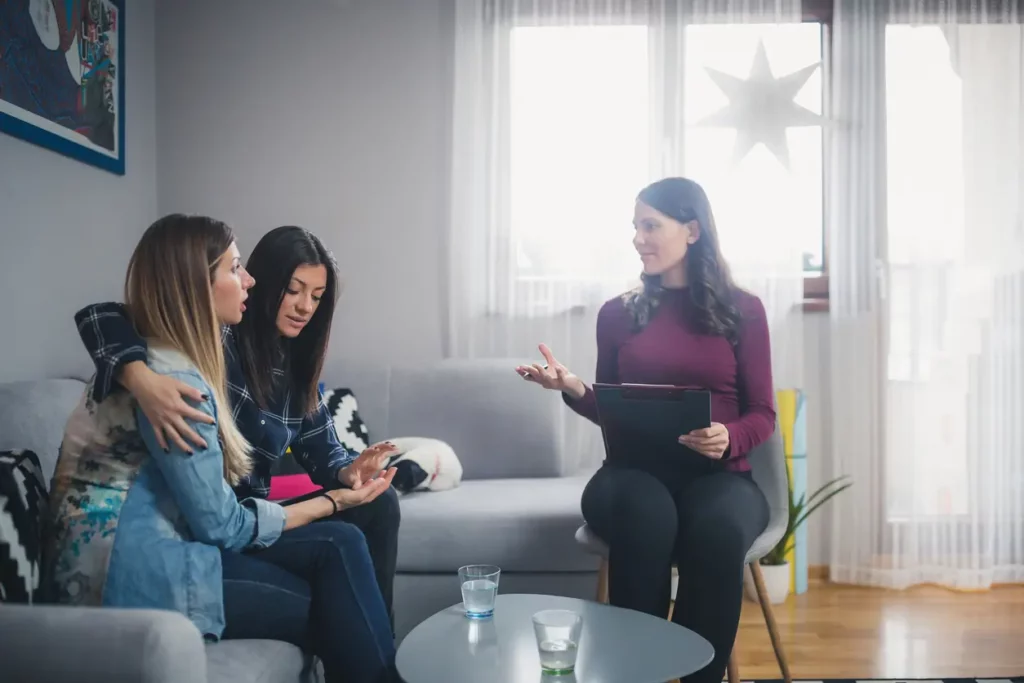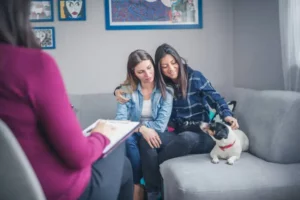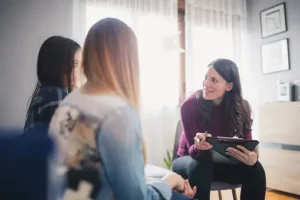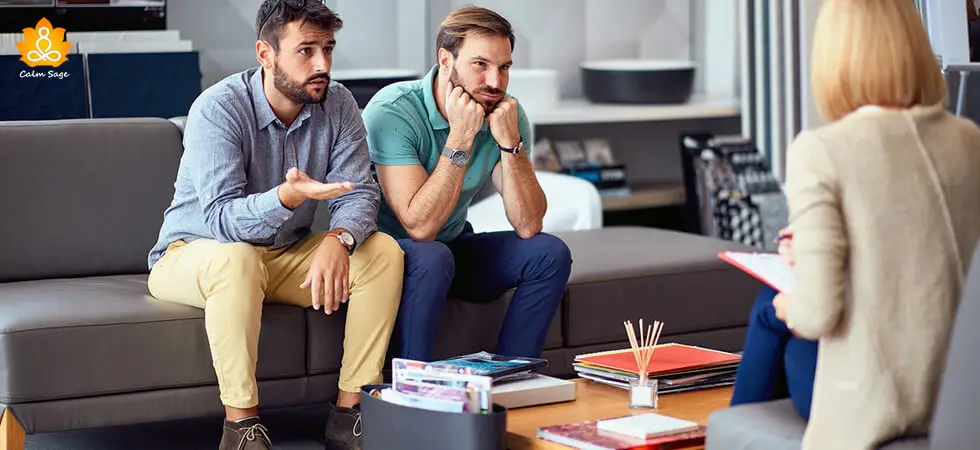Relationships are complex, filled with ups and downs, challenges, and triumphs. For individuals in the LGBT community, these complexities can sometimes be more pronounced due to the unique issues they face. This comprehensive guide will shed light on the world of LGBT relationship counseling, highlighting its significance and the various techniques and therapies employed.
Contents
Problems That Couples With Same-Sex Face
 While every relationship has its challenges, same-sex couples may face unique problems largely due to societal attitudes and legal discrimination. Here are some of the most common issues:
While every relationship has its challenges, same-sex couples may face unique problems largely due to societal attitudes and legal discrimination. Here are some of the most common issues:
- Societal Discrimination
Same-sex couples often face discrimination from society. This could take the form of degrading comments, physical or emotional abuse, or exclusion from social activities. These negative experiences can place a considerable amount of stress on the relationship. - Family Acceptance
Lack of family acceptance is another common issue. Their lack of acceptance or outright rejection can lead to significant emotional distress, affecting the stability and health of the relationship. - Coming Out
Coming out is a continuous process, and same-sex couples frequently have to navigate this difficult landscape. The fear of discrimination, rejection, or even violence can make this process exceedingly difficult, impacting both individuals and the relationship. - Legal Challenges
In many parts of the world, same-sex relationships are still not legally recognized. This lack of legal protection can pose a host of problems, including issues related to healthcare, property rights, and parenting rights. - Mental Health Issues
Due to the stigma and discrimination associated with their identity, LGBT individuals are at a higher risk for mental health issues. These mental health concerns can further compound the difficulties faced in a relationship. - Internalized Homophobia
Some individuals may struggle with internalized homophobia – a state where they have adopted society’s negative views about homosexuality and directed them toward their relationships. This can lead to feelings of shame and guilt affecting the overall relationship dynamics. - Minority Stress
Minority stress refers to the chronic stress faced by individuals belonging to stigmatized minority groups. For same-sex couples, this stress can be a result of contributing to a strain on their relationships.
By recognizing these problems, couples and therapists can work together to build resilience and improve relationship satisfaction.
How LGBT Relationship Counseling Can Help Them

LGBT relationship counseling can be a beacon of hope for many couples facing unique challenges. With a focus on understanding and empathy, it offers various benefits:
Improve Communication
One of the key aspects of any relationship is communication. Counselors can provide strategies and exercises that help couples communicate their feelings, needs, and concerns more effectively, fostering a deeper understanding between partners.
Dealing with Discrimination and Prejudice
Living in a society where discrimination and prejudice against LGBT individuals are still prevalent can take a toll on mental health and relationships. Counseling can help couples manage these stresses, build resilience, and cultivate a positive self-image.
Coming Out Support
The coming-out process can be fraught with fear, anxiety, and uncertainty. A relationship counselor can offer guidance and support throughout this journey, helping couples navigate through potential challenges and reactions from friends, family, and society.
Addressing Internalized Homophobia
Counselors can help clients address and overcome internalized homophobia. This involves recognizing and challenging negative beliefs about homosexuality, replacing them with positive self-acceptance and understanding.
Mental Health Support
As mentioned earlier, LGBT individuals are at a higher risk of mental health issues. Relationship counseling provides a safe environment to discuss these issues, explore coping strategies, and promote mental wellness.
Some counselors may also offer resources or referrals to help navigate the legal challenges faced by LGBT couples, from adoption rights to discrimination issues.
Improving Relationship Satisfaction
Finally, the overarching goal of LGBT relationship counseling is to improve relationship satisfaction. By addressing individual and relationship issues, counselors assist couples in building healthier, more satisfying relationships based on mutual understanding, respect, and love.
Techniques Used in LGBT Relationship Counseling
There are several therapy modalities and techniques used in LGBT relationship counseling, each designed to address specific issues and promote healthier relationships. Here are a few commonly used approaches:
Cognitive Behavioral Therapy (CBT)
 Cognitive Behavioral Therapy is often used in LGBT relationship counseling. CBT helps individuals recognize and challenge their negative thought patterns, replacing them with healthier, more positive ones. For LGBT couples, CBT can be particularly beneficial for tackling internalized homophobia, dealing with discrimination, or improving communication and problem-solving skills.
Cognitive Behavioral Therapy is often used in LGBT relationship counseling. CBT helps individuals recognize and challenge their negative thought patterns, replacing them with healthier, more positive ones. For LGBT couples, CBT can be particularly beneficial for tackling internalized homophobia, dealing with discrimination, or improving communication and problem-solving skills.
Acceptance and Commitment Therapy (ACT)
ACT can be instrumental in helping LGBT individuals deal with stigma and discrimination. The core principles of ACT involve accepting one’s feelings and situations without judgment, choosing valued directions, and committing to behavior changes that help live in accordance with these values.
Couples and Family Therapy
Couples therapy focuses on improving communication and resolving conflicts within the relationship, whereas family therapy might be used to improve understanding and acceptance among family members, especially during the coming-out process.
Narrative Therapy
Narrative Therapy is an approach that separates individuals from their problems, allowing them to externalize their issues. For LGBT couples, this can be a useful tool in dealing with societal prejudice, discrimination, and internalized homophobia.
EMDR (Eye Movement Desensitization and Reprocessing)
EMDR is often used for individuals dealing with traumatic experiences, including those stemming from discrimination or violence due to one’s sexual orientation or gender identity. It helps to reduce the intensity of traumatic memories and promote healthier coping mechanisms.
Mindfulness Techniques
Mindfulness techniques, including meditation and deep breathing exercises, are often incorporated into counseling. These techniques can help manage stress, promote emotional regulation, and improve mental well-being.
Each therapy approach is tailored to the individual’s or couple’s needs and circumstances. A competent therapist will work closely with you to choose the most appropriate and effective techniques for your situation.
How To Find The Right LGBT Relationship Counselor?
 Finding the right counselor for LGBT relationship therapy is an important step. Here are some tips to help you in your search:
Finding the right counselor for LGBT relationship therapy is an important step. Here are some tips to help you in your search:
- Look for Specialization
Look for those who specialize in LGBT issues, relationship counseling, or both. This ensures that they’re equipped with the necessary knowledge and skills to help navigate your unique challenges. - Consider Their Approach and Therapeutic Style
Every counselor has a unique approach and therapeutic style. You might find certain styles more comfortable and effective than others, so take the time to learn about the therapist’s approach. - Check Their Credentials
Ensure the counselor is licensed and credentialed by a recognized professional organization. - Seek Recommendations
If you know other individuals or couples who’ve had positive experiences with LGBT relationship counseling, ask them for recommendations. - Schedule a Consultation
Many therapists offer initial consultations. This provides an opportunity to ask questions and get a sense of whether you’re comfortable with them.
- Consider Logistical Factors
Practical considerations like location, availability, fees, and whether they accept your insurance are also important to think about.
Finding the right counselor can be a process, but it’s a crucial one. With the right support, LGBT relationship counseling can lead to stronger, healthier relationships and improved personal well-being.
Conclusion
LGBT relationship counseling is a specialized field designed to support individuals and couples within the LGBT community navigate their unique relationship challenges. Whether it’s about improving communication, dealing with discrimination and prejudice, supporting the coming-out process, or addressing mental health concerns, a knowledgeable and empathetic counselor can make a world of difference.
Although the journey might seem daunting, the potential rewards—stronger relationships, improved mental health, and a better understanding of oneself and one’s partner—are invaluable.
Marriage is a beautiful journey, However, every marriage encounters challenges. If you have any queries regarding Online Marriage Counseling experienced therapists at CoupleMantra can help: Book a trial couple therapy session


